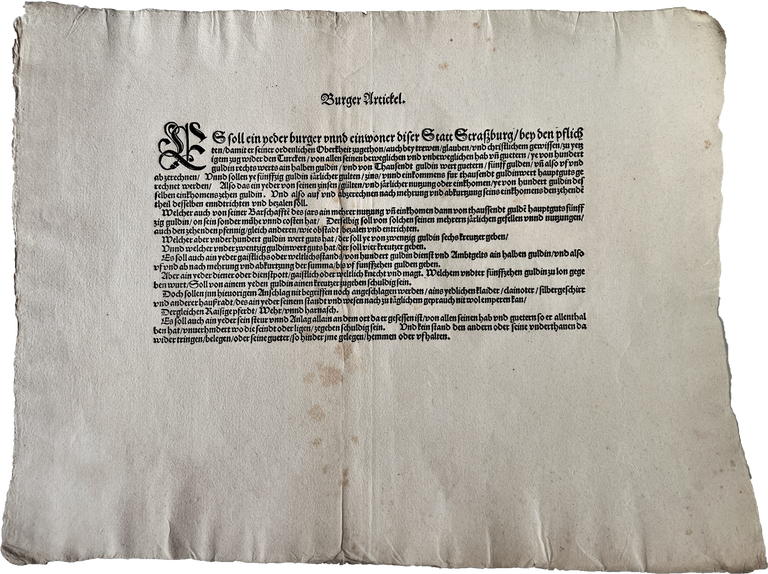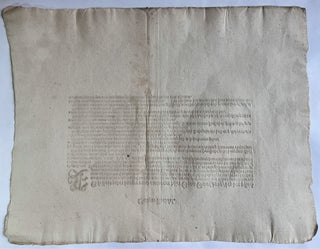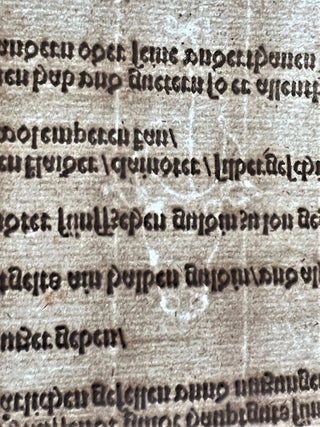Burger Artickel. Es soll ein yeder burger vnnd einwoner diser Statt Straßburg ... zu yetzigem zug wider den Turcken ... ye von hundert guldin rechts werts ain halben guldin ... Und also auf und abzerechnen ... und bezalen soll. Strassburg: [Wolfgang Köpfel? 1525].
Broadsheet (315 x 418 mm). 23 lines, gothic types, text 105 mm., first line and headline in larger font, 5-line woodcut initial E. Bull’s head watermark (59 x 30 mm.), deckle edges, unpressed. A few small spots and a minor crease, else fine.***
A broadside tax levy on citizens of Strassburg for a new campaign against the Ottoman Empire.
There had been sporadic efforts at direct taxation of all adult subjects by the Holy Roman Empire, but only one, a levy from 1495-1499 known as the “common penny,” had any success. “The hostility of rich townsmen to reveal collective wealth, along with their reluctance to pay for institutions operated for the benefit of princes, prevented the direct taxes from being a success” (Rowan 1977, p. 149). Thus, periodic tax levies for financing the wars against the Ottomans were delegated to the Empire’s various estates, the Prince-Bishoprics and Free Imperial Cities (of which Strassburg was one). The relative expectations of each were set forth in the Imperial Tax Register (Reichsmatrikel), a “list of the Imperial Estates of the Holy Roman Empire that specified the precise numbers of troops they had to supply to the Imperial Army and/or the financial support they had to make available to sustain the Army” (Wikipedia). In the sixteenth century a definitive imperial tax register was drawn up at the Diet of Worms in 1521; it was updated in 1532 in light of increased hostilities following Sulieman I’s siege of Vienna in 1529.
Levies for the purpose of fighting the Turks were known as Türkenhilfe, or Reichstürkenhilfe. The present example was, unlike some earlier taxes like the common penny, not regressive, requiring a straight 5% of the value of one’s goods: on 1000 guilders (or gulden), one had to pay 5 guilders, on 100 guilders a half guilder, and so on. Servants, both male and female, or anyone who earned less than fifteen guilders as wages, were required to pay one kreuzer (1/60th of a guilder) for every guilder earned. The poorest, however, who had no money to give, were tacitly exempted from the tax, as no one was expected to contribute “clothes, jewelry, silver plates, or other household goods needed for daily use.”
I locate 2 other copies of this broadside, at the Bibliothèque nationale et universitaire de Strasbourg and the SB Berlin, the latter with a contemporary title dating it to 1525. On typographic grounds the broadside may be tentatively ascribed to the press of Wolfgang Köpfel, active from 1522 to 1554.
Not in VD16. Cf. S. W. Rowan, “The Common Penny (1495-99) as a Source of German Social and Demographic History,” Central European History 10, no. 2 (1977): 148–64; and Rowan, “Imperial Taxes and German Politics in the Fifteenth Century: An Outline,” Central European History 13, no. 3 (1980): 203–17. Item #4182
No longer available
Status: On Hold



